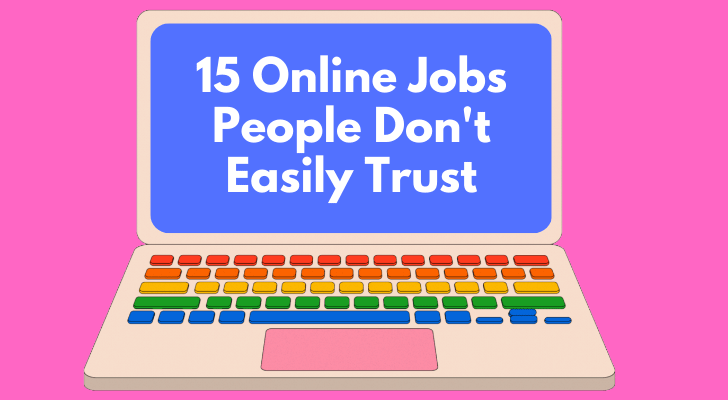Working online can come with a fair amount of apprehension; after all, who's to say if these jobs are real or not? It’s easy to get caught up in the hustle and bustle of working from home - but is it really worth it? In this blog post, we’ll explore 15 online jobs people don’t easily trust. From freelancing to writing gigs and more, let’s take a look at why these jobs can be so hard to trust—and how you can make sure you stay safe while still getting the most out of your workplace.

Why People Don't Trust Online Jobs
It takes time and a lot of communications before put your trust in someone. It's even harder online - you never know the real person behind the screen. So inevitably, the most common reason why people don't trust online jobs is that they are afraid of being scammed. You must have heard a few stories of people who have been scammed out of their hard-earned money by unscrupulous online job providers.
People are generally, unsure of the legitimacy of online jobs. Again, we do hear stories of people who were promised a great job but ended up getting nothing more than a minimum-wage job.
Another reason is that still a lot of people rely on information through face-to-face communications. They simply don't know where to look for reputable online jobs, or they don't know how much they can trust online. Especially those who are in older age groups may not be aware of the many reputable online job boards or job search engines that exist.
Scammer Profiles to Avoid
When looking for online work, there are certain profiles you should avoid. Here are some common scammer profiles to watch out for:
- The too-good-to-be-true profile: This is the profile that offers an amazing opportunity with very little effort required. They may promise high pay for minimal work, or offer a job that sounds too good to be true. Then it’s not true!
- The no-experience-needed profile: This scammer will often target people who are new to online work or who don't have a lot of experience. They may promise training or support, but in reality, they just want your money with no intention of providing any help.
- The fake testimonials profile: This scammer will post fake testimonials from other people supposedly vouching for them. These testimonials are usually from fake accounts or from people who were paid to write them. Don't be fooled by these!
- The overseas account profile: This scammer pretends to be based in another country, often in Africa or Asia. They may say they need help with their business and will send you money if you help them out by receiving payments into your bank account and then sending them on to another account overseas. This is a dangerous scam as you could end up being complicit in money laundering!
- The phishing profile: This scammer will send you a message or email that looks like it's from a legitimate business. They will often ask for personal information, such as your bank details, in the hope of accessing your account. Be wary of any requests for this information!

How to Spot a Scam
There are a few ways to spot a scam when looking for online jobs.
- Watch out for job postings that promise easy money for little work. These are usually scams, as there is no such thing as easy money.
- Be wary of jobs that require you to pay a fee upfront. These fees may be for things like training materials or background checks, but they can also be for simply getting the job itself.
- If the company asks for personal information like your Social Security number or bank account information before you've even had a chance to Interview with them.
If you come across any of these red flags, it's best to steer clear and look for other opportunities.
1. Online Jobs That Require Personal Information
Many online jobs require personal information, such as your name, address, and Social Security number. While these jobs may be legitimate, there is always the potential for identity theft. If you are considering an online job that requires personal information, be sure to research the company thoroughly before providing any information.
2. Online Jobs That Involve Investment
Some online jobs require some form of investment, and it can be hard to know if these are legitimate or not. Here are some tips to help you determine if an online job is a scam or not:
- Do some research on the company or individual offering the job. Check if they have a good reputation and see if other people have had positive experiences with them.
- Be wary of online jobs that require you to invest money upfront. If the job seems too good to be true, it probably is.
- Don't give out your personal information or financial information to anyone you don't trust.
If you're considering an online job that requires an investment, make sure you do your research and only work with reputable companies or individuals.
3. Online Surveys

One of the online jobs that people don't easily trust is surveys-for-cash. It's easy to see why this is the case, as there are many scams out there that claim you can make money by simply filling out surveys.
However, there are also legitimate companies that offer online surveys as a way to earn some extra cash. If you're interested in giving it a try, we recommend doing some research beforehand to find a reputable company to work with. Once you've found a few good options, sign up for a couple of different ones to see which one works best for you.
4. Data Entry
Data entry is often seen as an easy way to make money online, but there is an increasing number of scams associated with this type of work nowadays. Scammers use AI to automatically input data or sort data but not in the way that their clients want. So the results can be very wrong but the clients don’t realize it.
There are also many legitimate data entry jobs available, but for job seekers, it’s becoming very competitive. Whereas for clients, it’s becoming difficult to find real, experienced data entry clerks to hire.
5. Social Media Jobs
Social media jobs are entirely performance-based. If they can’t help your business increase revenue, the social media manager’s job is completely useless. Some too many people claim to be good at social media interactions, but some of them use tools to get
- bot followers,
- inactive followers, or
- Wrongly-targeted audiences.
For example, if you are selling physical products in the US, you need to target residents in the US, and you don’t need international clients. But self-proclaimed social media managers often bring people from unrelated countries, which will be a water of your money.
6. Online Tutoring
Online tutoring is becoming more and more popular, but there are still many people who don't trust it because;
- There are many scams out there. Some online tutoring services are not legitimate and will take your money without providing any service.
- You can't be sure that the person you're dealing with is qualified. When you're dealing with an online tutor, you can't be sure that they actually know what they're doing. They could be anyone - a student, a stay-at-home mom, or even a complete fraud.
- The quality of the service can be very variable. Even if you find a legitimate online tutoring service, the quality of the service can vary greatly from tutor to tutor. You might not get the help you need, or you might not be able to understand the tutor's explanations.
- It's difficult to build up a rapport with someone online. When you're working with an online tutor, it's difficult to build up the same kind of rapport that you would in a face-to-face setting. This can make it harder to get the help you need.
7. Freelance writing

Freelance writers cannot be trusted offhandedly. Some are scammy, others do not meet the standards, and some are the wrong types of writers.
- Some scammers who claim to be freelance writers use an automatic paraphrasing tool to spin the content. The sentences don’t make sense.
- Some writers charge a very low fee, such as $5 for 500 words, but their quality is extremely low. The content is very often common sense and overstretched.
- Some writers may be excellent but they are from the wrong country. “English-speaking” does not mean universal among any English-speaking countries. Words and expressions we use are different from country to country. People who a looking for authentic content targeted at US audiences would like someone proficient in American English to write it. But it’s not always achievable.
8. Virtual Bookkeeping
With the technological advances of recent years, more and more businesses are outsourcing their bookkeeping needs to virtual bookkeepers. While this can save the company money, it can also be a risk if the person hired is not reputable or reliable.
The reasons can be;
- The bookkeeper is not killed enough. It’s ok while they’re entering sales, purchases, and some simple adjustments. But when there are more complicated transactions, they tend to make mistakes or don’t know how to treat them.
- The bookkeeper is from a different country. The bookkeeping entry system is different, and sometimes the jargon they use is different. So it’s hard for the bookkeeper and the client to communicate in between.
- Their bookkeeping skill may be decent but they may not know how to use the software that the client uses.
There are a few things to consider when hiring a virtual bookkeeper:
- Make sure they have experience with the software you use. This will minimize training time and ensure they are familiar with your system.
- Ask for references from past clients. This will give you an idea of their work ethic and reliability.
- Inquire about their education and credentials. While not required, it can give you peace of mind knowing that they have the proper education and training for the job.
- Get a contract in place. This will outline the expectations of both parties and help avoid any misunderstandings down the road.
9. Website Design and Development
Website designers charge a lot of money, and because they often sell their service as a bundle. It can cost you a lot. For example;
- They not only do an initial setup of your website but they don’t grant you access to your site. As a result, every time you want to edit a blog or change a tiny detail, you have to contact the designer and ask them to make a change. Each time you will be charged.
- The designing fee includes the web hosting fee which is much more expensive than if you have it hosted by yourself.
- Even if the website is in your name, the ownership of the website is held by the designer. So it’s not really yours. Yet, if something goes wrong (such as the data vanished), the designer may not take responsibility.
10. Search Engine Optimization

There are so many SEO scammers who directly contact you, and claim to be able to rank your website higher and take your money but disappear without giving you a satisfactory result.
If an SEO agent contacts you by using a Gmail address, it’s a red flag, because they are ready to disappear at any time, and they are most likely to be an amateur who just tries to make extra money by cheap backlinking strategies.
They show your site performance or domain authority (DA) score as if they analyzed it themselves, but they are simply using tools such as SEMRush or Moz Domain Analysis, which anybody can do for free.
They might know very basic SEO knowledge, but they barely give you constructive advice.
11. Email Marketing
Email marketing is one of the most commonly used online marketing methods, yet it's also one of the least trusted.
- For users: In a world where we're constantly inundated with emails, it's no wonder that people are skeptical about giving out their personal email addresses. Because you don’t know who’s behind the whole email marketing system. Marketing agencies sell your email address to multiple other agencies. It means that once you’ve given out your address, your inbox can be filled with unsolicited emails over time.
- For business owners: New business owners are often encouraged to use solo ad services to promote their products. However, very few solo ad sellers have a target audience. The list of leads they have is likely to be of general internet users. It means that if you are trying to sell speciality products, solo ads don’t work.
With that said, email marketing can be a powerful tool to reach your target customers. But it’s essential that you learn the techniques so that you won’t waste your money or labeled as a spammer.
The techniques include;
- Sending personalized messages to your list of subscribers,
- Segmenting your list to send different messages to different groups of people,
- Tracking the results of your campaigns to see how effective they are, etc.
What Do You Advocate?
12. Affiliate Marketing
An increasing number of people are trying to avoid affiliate marketers because too many of them are trying to sell products deceptively. There have always been dishonest affiliate marketers.
However, with more people realizing they can make money online without investing any money, the number of spam affiliates is increasing. They randomly try to sell products online without learning how they can be trustworthy.
13. Dropshipping
Dropshipping businesses are often overrated. They can be very competitive, and many people prefer to buy from Amazon rather than from an unknown website. Plus, dropshipping businesses require a lot of work and can be difficult to scale.
There are a lot of potential pitfalls that can trip you up along the way. It's not impossible to succeed in drop shipping, but it's very hard to compete in terms of price, shipping time, and the quality of customer service.
14. Crowdfunding Campaigns
Crowdfunding is definitely a hit-or-miss proposition. If you're trying to raise funds for a new project, people can be very skeptical and it can be tough to convince them to part with their hard-earned money. Oftentimes, it takes a really great pitch and a lot of social proof to get people on board.
Some fundraisers ask for money from the public, but they don't follow up on what they do with the money. Once they raise the fund, they don't share any information about how the money was used, which makes donors feel as if they've been scammed. This is a major problem because it erodes trust between the fundraiser and the public. If people don't get to know what happened to the result of the crowdfunding until the end, it can have a devastating effect on fundraising efforts.
15. Online Coaching

Most online coaches are legit and helpful for sure. But it all depends on how trustworthy they can be.
- For one thing, if you want to learn something from a coach, you want to put your trust in them indefinitely. But many coaches give up teaching after a few months because they cannot get enough students. As a student, you would have to find someone else to teach you, which would be a waste of time and money.
- Some other coaches take expensive coaching fees upfront, disappear without completing the course as promised, or stop giving support after a while.
These are two of the main reasons people are skeptical about online coaching services.
As a student, when choosing a coach, you need to make sure to check their experience, their activities on YouTube and other social networks, as well as what other students say about them before making the final decision.
It means that if you want to start a coaching service, you need to be transparent in these areas; so you have longevity as well as the ability to fulfill your promises.
15 Online Jobs People Don't Easily Trust: Wrapping Up
Working online can be a great way to make money, but it’s important to research any job opportunities before signing on. There are plenty of legitimate online jobs available, but unfortunately, there are also many that should be avoided for safety and security reasons. I hope this article has provided some insight into which jobs people tend not to trust so you can make a good decision about the best ways to make money online.

